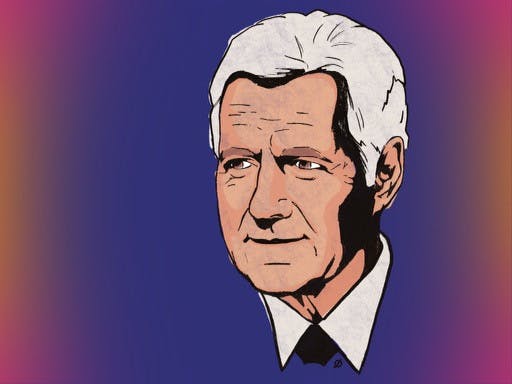Weeknights at 7:30 will never be the same.
As the wheel stops spinning while Pat Sajak and Vanna White wrap up “Wheel of Fortune” with their usual brief dialogue, game show enthusiasts have learned to hold their breath waiting for Alex Trebek to walk out of the hall and onto center stage to host “Jeopardy!”
“He was that constant force,” journalism senior Connor Smithee said. “He was there for the people that were loyal to ‘Jeopardy!’ and he was there as that constant force.”
Alex Trebek died on Sunday, Nov. 8 of stage 4 pancreatic cancer. His reign as host of “Jeopardy!” dates back to 1984, where he controlled the panel with a full head of hair and mustache to compliment it.
To put it in perspective, 1984 was 36 years ago. For Detroit sports fans, 1984 was the last time the Detroit Tigers won a World Series. For music buffs, songs like “When Doves Cry” by Prince and “Owner of a Lonely Heart” by Yes topped the charts. For movie nuts, “Ghostbusters,” “Gremlins” and “The Karate Kid” all premiered for the first time.
And for me, my dad was a sophomore in high school. Wow.
But so were many other college students’ parents. Alex Trebek’s presence on “Jeopardy!” was just as Smithee said: “a constant force.” He bridged the gap between generations, allowing us to find a common ground with people who were separated by age, beliefs, whatever. Whatever was going on, anyone who tuned in to "Jeopardy!" could count on Trebek being there as they flicked on their TV on weeknights.
“'Jeopardy!’ is something that everybody can sit down and watch,” comparative cultures and politics junior John Paul Murray said. “My grandpa is a huge conservative, so I have some disagreements there with him. But one thing even then we would love to do together is watch ‘Jeopardy!’”
Everyone has that thing in their relationships with the people they love. It could be a bond over a hobby, genre or taste. It could be a mutual friend. It could be a mutual dislike. It could be, really, whatever.
What makes “Jeopardy!” so impactful and everlasting is the fact that it's a shared part of so many people’s lives. Every night, people would welcome Alex Trebek into their own homes and give him 30 minutes to teach them something new. He was not only a game show host. He was a teacher.
“I just wanted to be good at ‘Jeopardy!’” Murray said. “It was part of what helped push me to start to learn things. And as I kept watching it and I started getting better at it, it was like almost a marker of progress.”
Competing on the game show is an honor esteemed by those who hold it. And while only a select few were chosen to play, “Jeopardy!” inspired the thirst for knowledge across all age groups. That’s why trivia apps like HQ and Trivia Crack had such a high approval rating. People wanted to learn.
Social relations and policy sophomore Shel Krause is no exception to those who want to learn. As someone who played these apps and watched “Jeopardy!” frequently, Krause said education — whether it be directly in a classroom or merely on a TV screen — is for everyone, no matter their age.
“I think that just goes to show that learning and the desire to expand your knowledge doesn’t really have generational boundaries,” Krause said.
Likewise, political theory and constitutional democracy junior Zack Myers said he came from a home where education was already revered. “Jeopardy!” helped further instill in him his inclination for information.
“My dad’s a college professor, so kind of a trivia person,” Myers said. “So, it would be quite a good bonding experience for us, and I think it sort of helped me realize that I wanted to just pursue knowledge because I really like going to school. That’s my thing.”
Learning was Burt Thakur’s thing too. Thakur, who was the “Jeopardy!” champion on Thursday, Nov. 5, had a powerful message for Trebek after his victory.
“Here’s a true story, man,” Thakur said. “I learned English because of you. And so, my grandfather who raised me — I’m going to get tears right now — I used to sit on his lap and watch you every day. So, it’s a pretty special moment. Thank you very much.”
Support student media!
Please consider donating to The State News and help fund the future of journalism.
Trebek changed lives by simply spitting out facts behind a podium, awaiting for his contestants’ responses that began with, “What is …” or, “Who are …” He was a cool-headed mind during a time when turmoil often boils over. He was a person whose soft smile and cunning remarks made the world seem simpler than it is.
“I think that speaks to all of us,” Smithee said. “That should speak to the fact you don’t know what kind of legacy or what kind of mark you’re going to leave on people.”
It is no doubt Trebek put his handprints into the wet cement of society and as a TV personality, he was always there watching his handprints dry as he continued to make more. Trebek felt like part of the family.
News of his passing left the world amiss as Twitter poured out its love for him, thanking him for so much: for educating us, for entertaining us and — for lack of better words — for plainly being there with us.
“You know, people like Alex Trebek or Bill Nye — all these cross-generational personalities that dedicated their lives to making learning a fun thing to do with you and your family — it’s just such an honorable path to take in life,” Krause said.
Discussion
Share and discuss “Column: Alex Trebek, 'a constant force' for us students of life” on social media.







